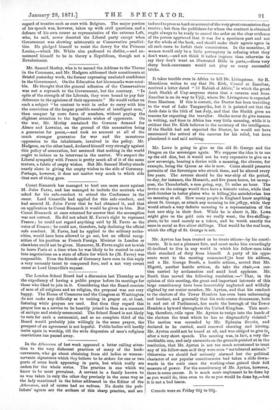Mr. Samuel Morley, who is to second the Address to
the Throne in the Commons, and Mr. Hodgson addressed their constituents at 'Bristol yesterday week, the former expressing unabated confidence in the Government. On the Education Act his remarks were sensi- ble. He thought that the general adhesion of the Conservatives was not a reproach to the Government, but the contrary. "In -spite of the strength of the Liberals, they were bound to pay fair -deference to the ppinions of their opponents." He would rather on -such a subject "be content to wait in order to carry with him the conviction of the largest possible number of intelligent men," than conquer by mere force of numbers, without paying the slightest attention to the legitimate wishes of opponents. On the war, Mr. Morley sustained the German demand for Alsace and Lorraine, on the ground of this annexation being a guarantee for peace,—and took no account at all of the much stronger guarantee for war and the monstrous .oppression to the inhabitants, involved in the policy. Mr. Hodgson, on the other hand, declared himself very strongly against this policy of annexation, but assumed that nothing in the world -ought to induce us to intervene in the matter. We suspect the Liberal sympathy with France is pretty much all of it of the same -texture, a fabric of empty wishes. But Mr. Samuel Morley stands 'nearly alone in giving the empty wishes to the side of Germany. Perhaps, however, it does not matter very much to which side that sort of thing goes.


































 Previous page
Previous page